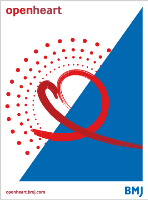
Open Heart
Scope & Guideline
Exploring Innovations in Heart Health
Introduction
Aims and Scopes
- Cardiovascular Disease Mechanisms and Epidemiology:
Research focusing on understanding the underlying mechanisms of cardiovascular diseases, including genetic, biochemical, and environmental factors that contribute to disease progression and outcomes. - Innovative Treatment Modalities:
Exploration of new and existing treatment strategies for cardiovascular conditions, including the use of novel pharmacological agents, devices, and interventional techniques. - Patient Outcomes and Quality of Care:
Studies aimed at assessing the effectiveness, safety, and quality of cardiovascular care, including patient-reported outcomes, healthcare utilization, and cost-effectiveness analyses. - Cardiac Imaging and Diagnostic Techniques:
Advancements in imaging technologies and diagnostic methodologies that enhance the detection and management of cardiovascular diseases. - Multimorbidity in Cardiovascular Patients:
Investigations into the intersection of cardiovascular diseases with other chronic conditions, exploring how comorbidities impact treatment and outcomes. - Health Disparities and Access to Care:
Research addressing the disparities in cardiovascular health outcomes across different populations, focusing on access to care and the social determinants of health.
Trending and Emerging
- Digital Health and Telemedicine:
The integration of digital health technologies and telemedicine platforms into cardiovascular care is gaining prominence, especially following the COVID-19 pandemic, as researchers explore their efficacy in improving patient access and outcomes. - Artificial Intelligence and Machine Learning:
There is a significant increase in studies utilizing artificial intelligence and machine learning for risk prediction, diagnostics, and treatment planning in cardiovascular care, demonstrating the potential for technology to enhance clinical decision-making. - Long COVID and Cardiovascular Implications:
Research examining the cardiovascular implications of long COVID is emerging as a critical area of focus, with studies investigating the long-term effects of COVID-19 on heart health and related conditions. - Personalized and Precision Medicine:
A trend towards personalized and precision medicine in cardiovascular care is evident, with an emphasis on tailoring treatments based on individual genetic, phenotypic, and environmental factors to optimize outcomes. - Social Determinants of Health in Cardiovascular Outcomes:
Increasing recognition of the role of social determinants of health in cardiovascular disease outcomes is driving research that examines how socioeconomic status, race, and access to care influence heart health.
Declining or Waning
- Traditional Risk Factor Studies:
While traditional cardiovascular risk factors (e.g., hypertension, hyperlipidemia) remain relevant, there is a noticeable decline in studies focused solely on these factors, as the field shifts towards more complex models that incorporate multimorbidity and social determinants. - Single-Agent Pharmacotherapy Trials:
Research on the efficacy of single-agent pharmacotherapy for cardiovascular diseases is declining, with a growing emphasis on combination therapies and personalized medicine approaches. - Basic Science Research:
There is a waning interest in purely basic science research without direct clinical applicability, as journals increasingly prioritize translational studies that bridge the gap between laboratory findings and clinical practice. - Standardized Clinical Protocols:
Research focusing on adherence to standardized clinical protocols is less prevalent, as there is a shift towards individualized patient care and tailored treatment strategies that consider unique patient characteristics.
Similar Journals
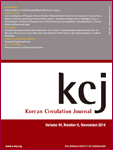
Korean Circulation Journal
Pioneering Insights in Cardiology and Cardiovascular Medicine.Korean Circulation Journal, published by the Korean Society of Cardiology, has established itself as a prominent platform for disseminating research in the fields of Cardiology and Cardiovascular Medicine. With an ISSN of 1738-5520 and an E-ISSN of 1738-5555, this journal has been at the forefront of cardiovascular science since its inception in 2006 and is projected to continue until 2024. The journal's commitment to quality is reflected in its 2023 category quartiles, ranking in the second quartile (Q2) for both Cardiology and Internal Medicine, as well as its commendable Scopus rankings within the respective fields. Located in South Korea, the journal aims to bridge the gap between cutting-edge research and practical applications, serving as an invaluable resource for researchers, healthcare professionals, and students keen on advancing their understanding of cardiovascular health. Although currently not an open-access journal, it provides a wealth of knowledge that encourages evidence-based practice in clinical settings.

REVISTA ESPANOLA DE CARDIOLOGIA
Transforming Cardiovascular Research into Real-World ImpactREVISTA ESPANOLA DE CARDIOLOGIA is a premier journal dedicated to the dynamic field of cardiology, published by EDICIONES DOYMA S A in Barcelona, Spain. With an impressive Q1 status in the Medicine (miscellaneous) category for 2023, this journal is recognized for its significant contributions to cardiovascular research, evidenced by its rank of #61 out of 387 in the Scopus database, placing it within the top 16% of journals in its field. Covering a broad range of topics within cardiology, the journal aims to disseminate high-quality research, clinical studies, and educational content, fostering knowledge sharing among researchers, clinicians, and students alike. While it does not currently offer open access, the journal maintains a commitment to advancing cardiovascular health through rigorous peer-reviewed articles. With a publication history that spans from 2013 to 2024, REVISTA ESPANOLA DE CARDIOLOGIA is an essential resource for those seeking to stay at the forefront of cardiology advancements and practices.

HEART
Empowering Cardiovascular Excellence Through ResearchHEART is a leading peer-reviewed journal published by the BMJ Publishing Group, specializing in the field of Cardiology and Cardiovascular Medicine. Established in 1942, the journal has evolved as a premier platform for disseminating high-quality research, innovative practices, and clinical advancements within the cardiovascular domain. With an impressive impact factor and ranked in the Q1 category in 2023, it positions itself among the top-tier journals in its field, boasting a Scopus rank of #37 out of 387 in this highly competitive area, representing the top 10th percentile nationally. The journal supports both traditional and open access options, thereby enhancing the global visibility and reach of its published work. Researchers, professionals, and students alike will find HEART to be an invaluable resource, offering the latest insights and developments that drive the field forward and improve patient care worldwide.

Journal fur Kardiologie
Unveiling the Latest in Cardiac Health Research.The Journal fur Kardiologie, published by KRAUSE & PACHERNEGG GMBH, is a pivotal resource in the field of Cardiology and Cardiovascular Medicine. With an ISSN of 1024-0098 and an E-ISSN of 1680-936X, this journal has played a significant role in disseminating valuable research and clinical studies from 1998 until its coverage discontinuation in Scopus in 2017. Despite its Scopus rank being relatively low at #316/324 in its category, it continues to serve as a platform for emerging cardiology research. The journal’s scope encompasses various aspects of cardiovascular health, providing insights that are crucial for researchers, professionals, and students alike seeking to advance their knowledge and practice in cardiology. While the journal is not open access, its contributions to the field are essential for those looking to stay informed about the latest developments in cardiovascular medicine.
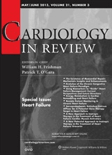
Cardiology in Review
Bridging research and practice in cardiology.Cardiology in Review, published by Lippincott Williams & Wilkins, is a prominent journal focused on advancing the field of cardiology and cardiovascular medicine. With a history of publication spanning from 1995 to 2024, the journal serves as an essential resource for researchers, healthcare professionals, and students alike, offering in-depth reviews and analyses on the latest developments, clinical practices, and research findings in cardiology. Despite being a traditional print journal, it maintains a commendable Q2 ranking in both cardiology and miscellaneous medicine categories as of 2023, reflecting its influence and rigor in the academic community, with a Scopus rank of #132 out of 387 in its field, placing it in the 66th percentile. The journal aims to bridge the gap between clinical practice and emerging research, promoting a deeper understanding and integration of innovative strategies in cardiovascular care. With its commitment to high-quality scholarship, Cardiology in Review remains a vital conduit for knowledge and dialogue within the evolving landscape of cardiovascular health.
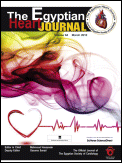
Egyptian Heart Journal
Advancing cardiovascular knowledge for a healthier tomorrow.The Egyptian Heart Journal, published by Springer, is a premier open-access journal dedicated to advancing the field of cardiology and cardiovascular medicine. As of 2023, it holds a Q3 classification within the category, showcasing its growing influence within the research community, and ranks 241 out of 387 in Scopus, reflecting a 37th percentile position. With an E-ISSN of 2090-911X, this journal has been open access since 2011, making it easily accessible to researchers, practitioners, and students alike. The journal aims to disseminate high-quality research articles, reviews, and case studies that contribute to the understanding and treatment of cardiovascular diseases. With its focus on innovative and practical solutions in cardiology, the Egyptian Heart Journal plays a critical role in shaping current and future cardiovascular research. Its global outreach and commitment to open access ensure that vital information is available to a wide audience, enhancing both scholarly discourse and clinical practice in the evolving landscape of cardiovascular medicine.
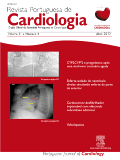
Revista Portuguesa de Cardiologia
Exploring innovative solutions in cardiology since 1970.Revista Portuguesa de Cardiologia, published by Elsevier España SLU, stands as a pivotal resource in the realm of Cardiology and Cardiovascular Medicine. With its origins tracing back to 1970, this journal has cultivated a robust academic presence, achieving a 2023 Q3 ranking in its category, and currently holding a position of #220 out of 387 on the Scopus rankings, placing it within the 43rd percentile of its field. This open access journal, available since 2011, aims to disseminate high-quality research and insights relevant to contemporary cardiovascular issues. Its commitment to accessibility and knowledge exchange enhances its importance for clinicians, researchers, and students alike, fostering a more informed community in the fight against cardiovascular diseases. Operating from its base in Barcelona, Spain, the journal welcomes contributions that further the understanding and treatment of heart conditions, contributing significantly to the advancement of cardiovascular health.

CIRCULATION
Pioneering Research for a Healthier Heart.CIRCULATION is a premier journal in the field of cardiology and cardiovascular medicine, published by Lippincott Williams & Wilkins. With a distinguished history dating back to 1950, the journal has consistently been at the forefront of critical research, showcasing significant advancements and discoveries in cardiovascular health. It holds a remarkable Q1 ranking in both the fields of Cardiology and Physiology (medical) according to the 2023 category quartiles, demonstrating its influential role among the top publications in these disciplines. With an impressive Scopus ranking, placed 3rd out of 387 in Cardiology and 2nd out of 113 in Physiology, CIRCULATION is essential reading for researchers, practitioners, and students passionate about advancing their understanding of heart health and related medical sciences. Although the journal is not open access, it continues to foster scholarly exchange and innovation in cardiovascular research, making it an indispensable resource for quality insights and groundbreaking studies.

Current Treatment Options in Cardiovascular Medicine
Advancing cardiovascular care through evidence-based insights.Current Treatment Options in Cardiovascular Medicine is a leading journal dedicated to advancing knowledge in the field of cardiology and cardiovascular medicine. Published by SpringerNature, this journal seeks to bridge the gap between clinical practice and research by providing comprehensive reviews, insightful analyses, and updates on the latest treatment modalities available for cardiovascular diseases. With an ISSN of 1092-8464 and an E-ISSN of 1534-3189, it displays a commitment to disseminating critical information to healthcare professionals and researchers globally. Despite its recent categorization in the Q3 quartile, the journal continues to maintain relevance with a Scopus rank of #246 in the field, reflecting its contribution to the ongoing discourse in cardiovascular care. The publication encompasses a broad spectrum of topics, from interventional cardiology to pharmacotherapy, supporting the journal's objective to enhance patient care through evidence-based treatment options. Researchers, professionals, and students will find Current Treatment Options in Cardiovascular Medicine an indispensable resource for staying at the forefront of cardiovascular innovations and applications.
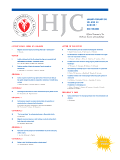
Hellenic Journal of Cardiology
Elevating Cardiovascular Science with Open Access ExcellenceThe Hellenic Journal of Cardiology, a peer-reviewed open-access publication under the esteemed ELSEVIER banner, proudly represents the forefront of research in the field of Cardiology and Cardiovascular Medicine. Established in 1993 and actively publishing since then, this journal has carved a niche in disseminating high-quality research and clinical insights relevant to cardiovascular health in Greece and beyond. With an impressive Q2 ranking in both Cardiology and Cardiovascular Medicine categories as of 2023, the journal holds a commendable position at Rank #126/387 in Scopus, indicative of its critical role in advancing scientific knowledge and practice. The Hellenic Journal of Cardiology transitioned to open access in 2016, ensuring that ground-breaking research is freely accessible, fostering a global dialogue among researchers, clinicians, and students alike. Its publication frequency spans significant years, providing a continuous flow of innovative findings while addressing pressing cardiovascular issues. As the journal builds on its legacy, it aspires to enrich the academic community's understanding of cardiovascular medicine, making it an invaluable resource for anyone invested in heart health.